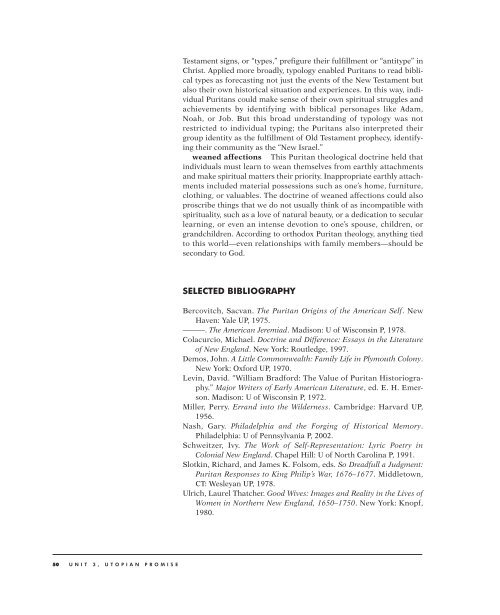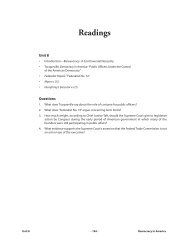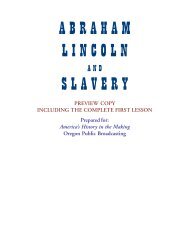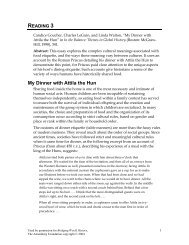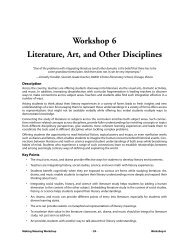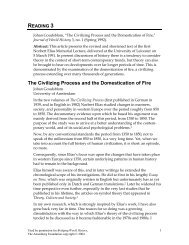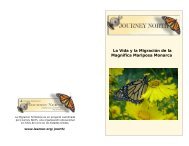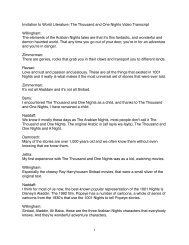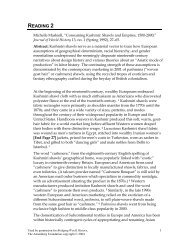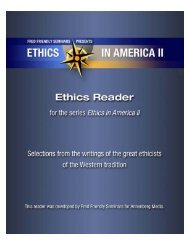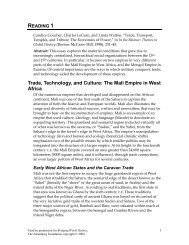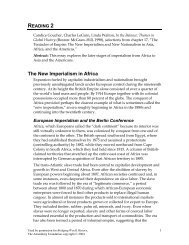UTOPIAN PROMISE - Annenberg Media
UTOPIAN PROMISE - Annenberg Media
UTOPIAN PROMISE - Annenberg Media
Create successful ePaper yourself
Turn your PDF publications into a flip-book with our unique Google optimized e-Paper software.
50 UNIT 3, <strong>UTOPIAN</strong> <strong>PROMISE</strong><br />
Testament signs, or “types,” prefigure their fulfillment or “antitype” in<br />
Christ. Applied more broadly, typology enabled Puritans to read biblical<br />
types as forecasting not just the events of the New Testament but<br />
also their own historical situation and experiences. In this way, individual<br />
Puritans could make sense of their own spiritual struggles and<br />
achievements by identifying with biblical personages like Adam,<br />
Noah, or Job. But this broad understanding of typology was not<br />
restricted to individual typing; the Puritans also interpreted their<br />
group identity as the fulfillment of Old Testament prophecy, identifying<br />
their community as the “New Israel.”<br />
weaned affections This Puritan theological doctrine held that<br />
individuals must learn to wean themselves from earthly attachments<br />
and make spiritual matters their priority. Inappropriate earthly attachments<br />
included material possessions such as one’s home, furniture,<br />
clothing, or valuables. The doctrine of weaned affections could also<br />
proscribe things that we do not usually think of as incompatible with<br />
spirituality, such as a love of natural beauty, or a dedication to secular<br />
learning, or even an intense devotion to one’s spouse, children, or<br />
grandchildren. According to orthodox Puritan theology, anything tied<br />
to this world—even relationships with family members—should be<br />
secondary to God.<br />
SELECTED BIBLIOGRAPHY<br />
Bercovitch, Sacvan. The Puritan Origins of the American Self. New<br />
Haven: Yale UP, 1975.<br />
———. The American Jeremiad. Madison: U of Wisconsin P, 1978.<br />
Colacurcio, Michael. Doctrine and Difference: Essays in the Literature<br />
of New England. New York: Routledge, 1997.<br />
Demos, John. A Little Commonwealth: Family Life in Plymouth Colony.<br />
New York: Oxford UP, 1970.<br />
Levin, David. “William Bradford: The Value of Puritan Historiography.”<br />
Major Writers of Early American Literature, ed. E. H. Emerson.<br />
Madison: U of Wisconsin P, 1972.<br />
Miller, Perry. Errand into the Wilderness. Cambridge: Harvard UP,<br />
1956.<br />
Nash, Gary. Philadelphia and the Forging of Historical Memory.<br />
Philadelphia: U of Pennsylvania P, 2002.<br />
Schweitzer, Ivy. The Work of Self-Representation: Lyric Poetry in<br />
Colonial New England. Chapel Hill: U of North Carolina P, 1991.<br />
Slotkin, Richard, and James K. Folsom, eds. So Dreadfull a Judgment:<br />
Puritan Responses to King Philip’s War, 1676–1677. Middletown,<br />
CT: Wesleyan UP, 1978.<br />
Ulrich, Laurel Thatcher. Good Wives: Images and Reality in the Lives of<br />
Women in Northern New England, 1650–1750. New York: Knopf,<br />
1980.


